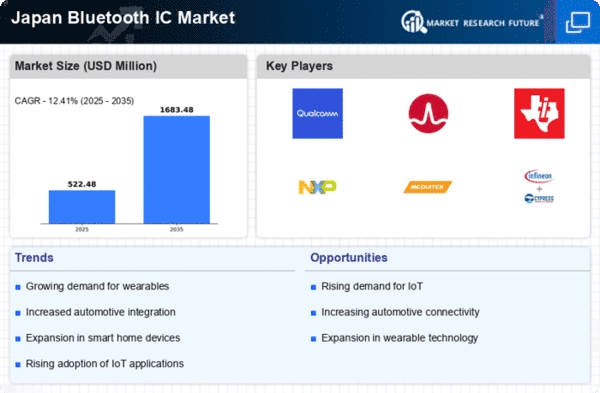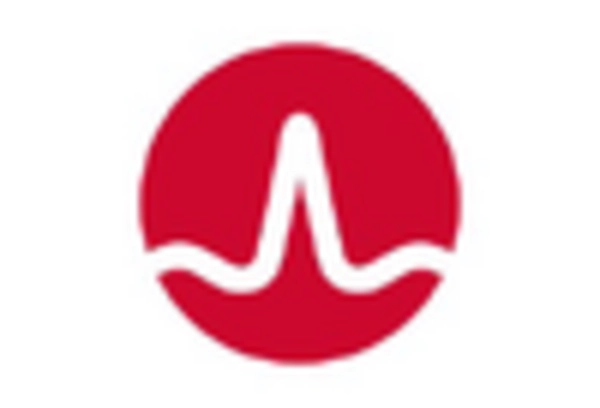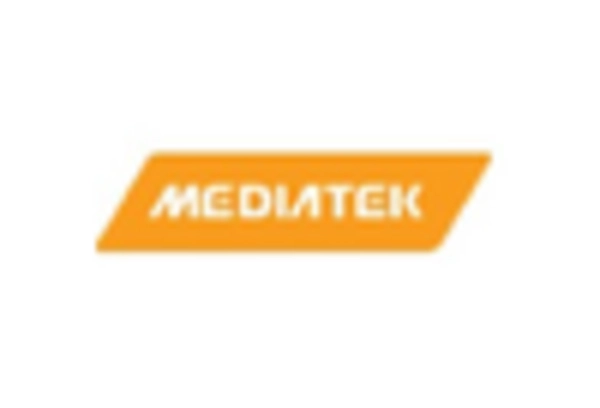Expansion of IoT Applications
The proliferation of Internet of Things (IoT) applications in Japan is a critical driver for the bluetooth ic market. With the increasing integration of smart technologies in various sectors, including healthcare, automotive, and home automation, the demand for efficient and reliable bluetooth solutions is on the rise. It is estimated that the IoT market in Japan will reach approximately $30 billion by 2026, with a substantial portion attributed to bluetooth-enabled devices. This expansion necessitates the development of robust bluetooth ic solutions that can support a wide range of applications, thereby propelling the growth of the bluetooth ic market. As companies invest in IoT technologies, the need for seamless connectivity will further enhance the relevance of bluetooth ic components.
Growth in Wearable Technology
The bluetooth ic market in Japan is significantly influenced by the rapid growth of wearable technology. Devices such as smartwatches, fitness trackers, and health monitors are becoming increasingly popular among consumers. Recent statistics indicate that the wearable technology market is expected to grow by over 20% annually, driven by rising health awareness and the desire for fitness tracking. This trend compels manufacturers to enhance their bluetooth ic offerings to ensure compatibility and performance in wearable devices. As a result, the bluetooth ic market is likely to see a surge in innovation, with a focus on miniaturization and energy efficiency to cater to the unique requirements of wearable technology.
Consumer Electronics Innovation
The continuous innovation in consumer electronics is a pivotal driver for the bluetooth ic market in Japan. As manufacturers strive to differentiate their products, the integration of advanced bluetooth features becomes essential. Recent data indicates that the consumer electronics market is projected to grow by approximately 10% annually, with bluetooth technology playing a crucial role in enhancing product functionality. This innovation not only improves user experience but also drives the demand for high-performance bluetooth ic solutions. As a result, the bluetooth ic market is likely to benefit from the ongoing advancements in consumer electronics, leading to increased investment in research and development to create cutting-edge bluetooth technologies.
Surge in Wireless Audio Devices
The bluetooth ic market in Japan experiences a notable surge in demand for wireless audio devices, such as headphones and speakers. This trend is driven by the increasing consumer preference for convenience and mobility. According to recent data, the wireless audio segment is projected to grow at a CAGR of approximately 15% over the next five years. As more consumers opt for wireless solutions, manufacturers are compelled to innovate and enhance their bluetooth ic offerings. This shift not only boosts sales but also encourages the development of advanced features, such as noise cancellation and improved battery life. Consequently, the bluetooth ic market is likely to witness significant growth as companies strive to meet the evolving needs of tech-savvy consumers.
Rising Adoption in Automotive Sector
The automotive sector in Japan is witnessing a significant shift towards the adoption of bluetooth technology, which serves as a key driver for the bluetooth ic market. With the increasing emphasis on vehicle connectivity and the integration of advanced driver-assistance systems (ADAS), the demand for bluetooth-enabled solutions is expected to rise. Recent reports suggest that the automotive bluetooth market could reach $5 billion by 2027, highlighting the growing importance of connectivity in vehicles. This trend encourages manufacturers to develop specialized bluetooth ic solutions tailored for automotive applications, thereby enhancing the overall safety and user experience. Consequently, the bluetooth ic market is poised for growth as automotive companies prioritize connectivity features.













